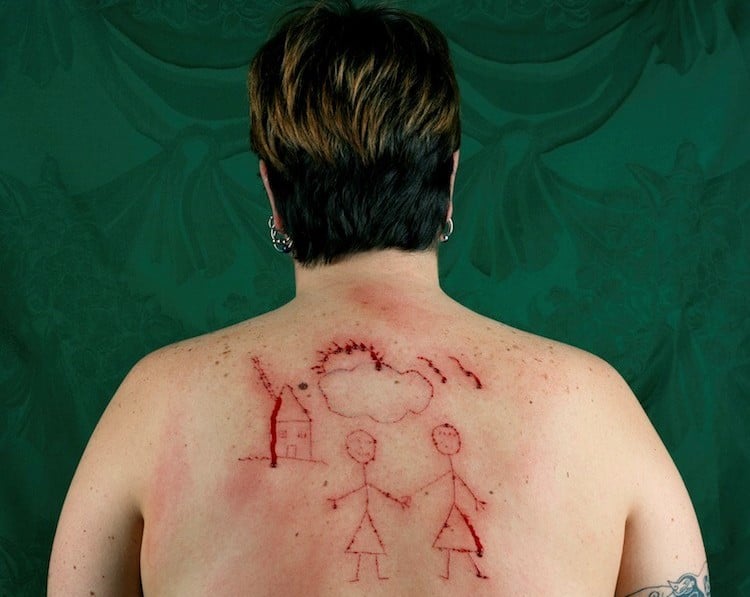
Image: © Catherine Opie. Courtesy Regen Projects, Los Angeles and Lehmann Maupin, New York and Hong Kong.
Catherine Opie (R) and Julie Burleigh (L) attend the LACMA 50th Anniversary Gala on April 18, 2015.
Photo by Charley Gallay/Getty Images for LACMA.
For Catherine Opie’s ninth birthday, her parents gifted her a Kodak Instamatic camera. She immediately began photographing the world around her, creating portraits of herself, Barbie dolls, her cat, and her hometown of Sandusky, Ohio.
Those who know her work will recognize that not too much has changed in terms of Opie’s desire to document her life and interests. Her early work consists of portraits of her friends from queer and BDSM communities, and some of her photographs, notably “Self Portrait/Cutting” (1993) and “Self Portrait/Pervert” (1994) garnered controversy for their graphic and sexual content.
Catherine Opie, Self-Portrait / Cutting (1993).
Image: © Catherine Opie. Courtesy Regen Projects, Los Angeles and Lehmann Maupin, New York and Hong Kong.
She has since taken portraits of artists, designers, and writers in the style of Old Masters, surfers, high school football players, and more. She has also tackled inscrutable landscapes, and she recently shot the home and belongings of the late Elizabeth Taylor for her series 700 Nimes Road.
We spoke to the artist in advance of her 55th birthday to find out what she’s learned about art, life, and radicalism.
Catherine Opie, Miggi & Ilene, Los Angeles, California (1995).
Image: © Catherine Opie. Courtesy Regen Projects, Los Angeles and Lehmann Maupin, New York and Hong Kong.
On how her photographs have changed:
“I think that the work has become more sophisticated than when I was nine [laughs], but I would still say those early interests and ideas around wanting to make images are still very true to who I am as a person.”
“The way that I work with cameras is really different [now]. Not so much how I think about making images, nor am I constructing in Photoshop like a lot of contemporary photographers. But just the idea of large format cameras from shooting 8×10 and 4×5. Going into medium-format digital has really been able to change the way that I work.”
Catherine Opie, Football Landscape #3 (Notre Dame vs. St. Thomas More, Lafayette, LA) (2007).
Image: © Catherine Opie. Courtesy Regen Projects, Los Angeles and Lehmann Maupin, New York and Hong Kong.
On small cameras:
“I don’t think the high school football landscape series and the portraits would have ever existed without being able to purchase a new, high-end medium format digital camera. People already laughed at me with the camera I was using, they were like”you’re not a sports photographer!” I can’t even imagine how much they would have laughed at me if they had seen me setting up a 4×5.”
On her evolving studio process:
“Having an assistant is a really good thing, I’ve figured that out. After making all the work myself for years and teaching full-time, for the last five years I’ve had an amazing assistant. This is the first time I’ve had a full-time assistant, and it’s kind of incredible how much more you can get done.”
“The next thing I wanna do is try to get a bigger studio, because I have a little teeny studio behind my old house. I would like to have a larger space to photograph in; I think it would change my portraits a lot, I think my portraits are limited by space quite a bit.”
On the most important lessons of her career:
“Perseverance is the number one thing… The idea that you can be radical at the same time as trying to hold a place for humanity, and that being radical doesn’t necessarily involve being derogatory or mean in any way.”
Catherine Opie, Justin Bond (1993).
Image: © Catherine Opie. Courtesy Regen Projects, Los Angeles and Lehmann Maupin, New York and Hong Kong.
On celebrating her 55th birthday:
“Well, I’m giving a lecture at NYU on my birthday. That’s my birthday celebration [laughs]. Then the day after I have a board meeting with the Warhol Foundation. But then I’ll come home on Sunday and my whole family will be having a birthday dinner for me here at home.”
On the best birthday party she’s ever been to:
“Oh my god, the best birthday party I’ve ever been to would probably be [celebrity portrait photographer] Greg Gorman’s 50th birthday party at his studio. That was just crazy. Justin Bond performed, John Waters was giving toasts, there was just an amazing amount of crossover between celebrity culture and art culture.”